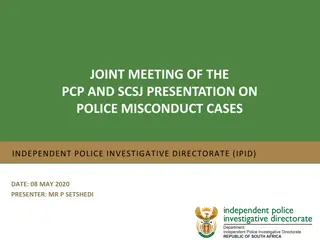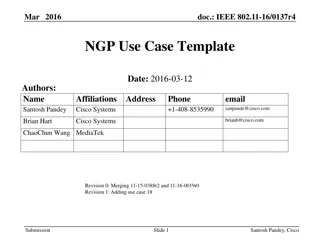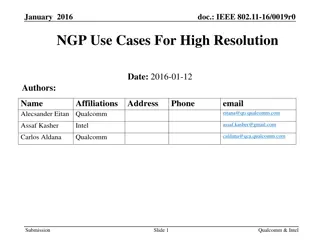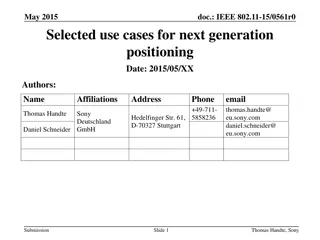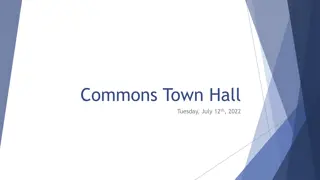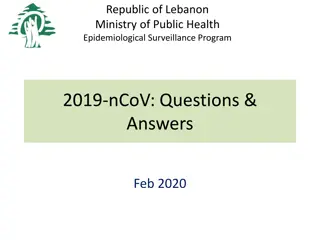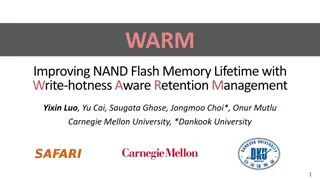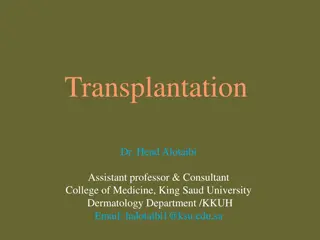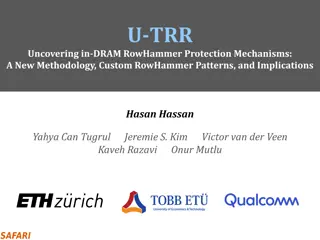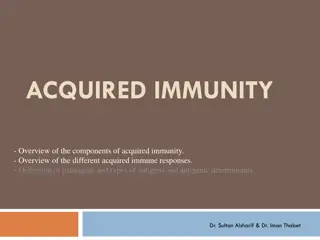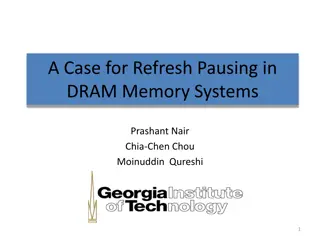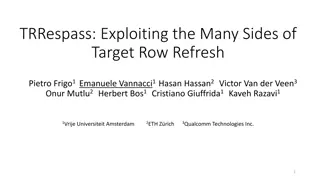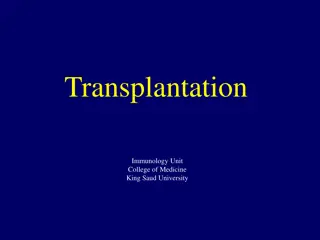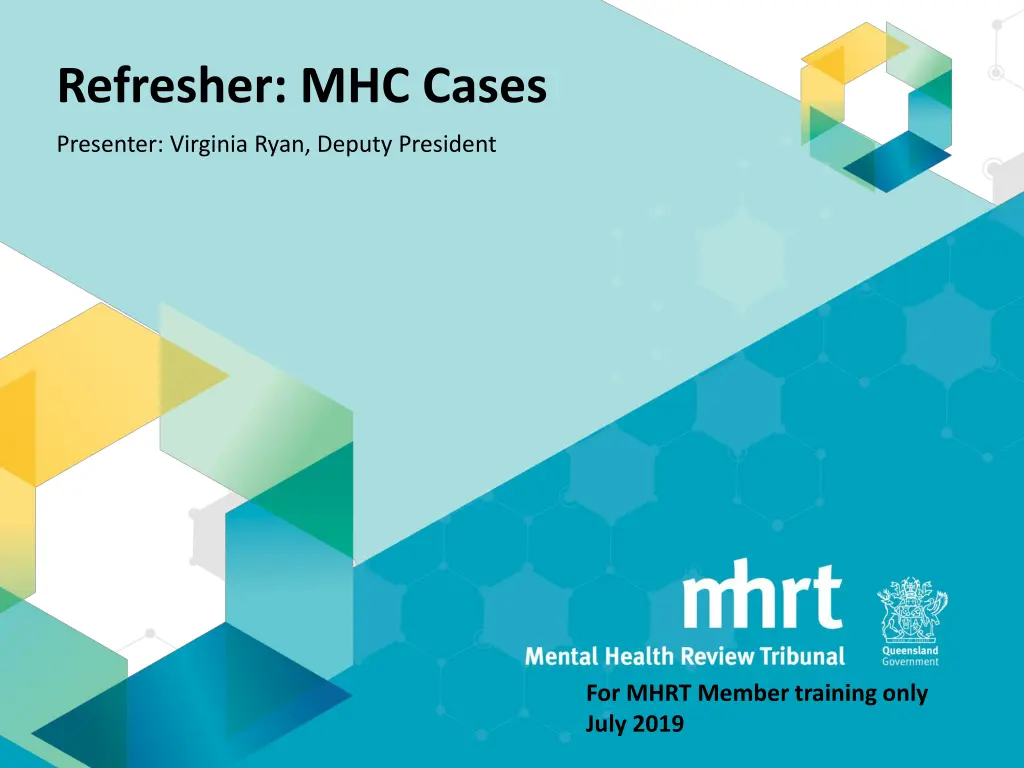
Exploring Mental Health Court Decisions and Appeals Process
Delve into the workings of the Mental Health Court as it relates to the Mental Health Review Tribunal (MHRT) and the appeals process. Understand the relationship between the two entities, the role of the MHCR, and how decisions are communicated to members. Access resources to find relevant MHRT cases and gain insights into the decision-making procedures.
Uploaded on | 0 Views
Download Presentation

Please find below an Image/Link to download the presentation.
The content on the website is provided AS IS for your information and personal use only. It may not be sold, licensed, or shared on other websites without obtaining consent from the author. If you encounter any issues during the download, it is possible that the publisher has removed the file from their server.
You are allowed to download the files provided on this website for personal or commercial use, subject to the condition that they are used lawfully. All files are the property of their respective owners.
The content on the website is provided AS IS for your information and personal use only. It may not be sold, licensed, or shared on other websites without obtaining consent from the author.
E N D
Presentation Transcript
Refresher: MHC Cases Presenter: Virginia Ryan, Deputy President For MHRT Member training only July 2019
Topics 1. Relationship between MHC and MHRT 2. THL Who must attend from the treating team? 3. Appeal to MHC00D ECT second opinions 4. Appeal to MHC001 & Appeal to MHC00B Role of AG 5. Appeal to MHC001 Unanimous opinions 6. Appeal to MHC003 & Re Panovic NFFT when not able to give proper instructions
MHC and MHRT Just to refresh: MHC is a Supreme Court jurisdiction made up of the President (Dalton J) and 1 Judge (Flanagan J). It has inherent jurisdiction (contrast with the MHRT). MHRT is not a court of record. Tribunal not bound to follow its own decisions. Consistency of decision-making assisted by following MHC s decisions. Making a decision that a panel knows would be overturned on appeal not good decision-making practice. The MHRT is not a party to any proceedings in the MHC so has no ability to make submissions. For each appeal, the MHC requests a statement of reasons. However, the appeal is heard de novo (meaning that the MHC hears the matter afresh and can consider new evidence).
Decisions from the MHC The Mental Health Court Registry (MHCR) sends decisions, reasons, transcripts and other materials (e.g. medical reports before the MHC) to the MHRT after a decision is made. Can be some delay in receipt of these documents (in some cases, months). When forensic order or treatment support order made by the MHC - the relevant documents are included in forensic dossiers. On appeals of forensic orders or treatment support orders the decision documents and relevant reports are included in the forensic dossier.
Finding MHC Cases MHRT Website Log in to the members section
Finding MHC Cases MHC Website: https://www.sclqld.org.au/caselaw/QMHC
Decisions to Members References Members can read reasons for reference decisions made by the MHC only if the MHC publishes the decisions on the MHC website. Relevant material is included in the forensic dossier and will therefore be available to members hearing the matter. The Tribunal office is provided a copy of all references but does not have authority from the MHC to publish these reasons. Appeals Some appeal decisions are published by MHC on their website. Relevant material is included in the forensic dossier (for forensic orders and treatment support orders). The Tribunal office is provided a copy and has permission from the President of the MHC to publish de-identified versions of appeals under MHA2016 on a restricted access area of the website for members to guide their practice and for information and training purposes.
AG for the State of Qld v THL Attorney-General for the State of Queensland v THL [2012] QMHC 20 Copy of the reasons available on the MHC website. Heard by Justice Boddice. The AG appealed a decision of the MHRT confirming a forensic order and approved LCT for THL. The issues for the MHC were whether the Tribunal: determined the matter in the absence of sufficient material ought to have heard from THL s treating psychiatrist and family could be satisfied on the available material that the overnight leave conditions were appropriate as THL was an unacceptable risk of harming himself or others.
AG for the State of Qld v THL Facts: THL 38 year old male Placed on an FO in 2008 found of unsound mind in relation to charges of assault occasioning bodily harm, breach of bail conditions and failure to obey a direction. Suffers from chronic paranoid schizophrenia. Has had mental illness since his late teenage years and has had numerous hospital admissions. Has an extensive forensic history, including offences of violence. At the time of the appeal, THL remained in Medium Secure Unit at The Park.
AG for the State of Qld v THL Tribunal hearing: MHRT approved overnight leave on 2 consecutive nights at his sister s residence (living at that residence were his sister, her husband and five children). THL s consultant psychiatrist and regular registrar were not available to give evidence. MHRT heard from a doctor Dr Bower - who had been asked to stand in place of regular registrar. Dr Bower gave evidence of THL s history, responses to graduated leave and present medication. Dr Bower said: THL had been accessing LCT without incident. THL still experienced auditory hallucinations, which were derogatory, not command. The presence of the hallucinations raised THL s risk.
AG for the State of Qld v THL Tribunal decision: MHRT noted that while Treating Team were not requesting any changes to LCT, there was ambiguity in wording of current conditions which would allow interpretation of 2 consecutive nights of leave, twice per week that is, 4 nights in any one week. MHRT noted the following as relevant to their decision: THL s rehabilitation needs. THL s current mental state. THL s leave closely monitored by staff. Subject to urine drug screens (negative). THL had been exercising leave without incident. Family is supportive and are a protective factor. THL compliant with treatment and willing to continue. THL is aware leave is cancelled should he not comply with conditions. THL does not represent an unacceptable risk of aggression and violence with currently level of monitoring, treatment and support.
AG for the State of Qld v THL Appeal submissions: Attorney-General: Tribunal could not be satisfied to the requisite standard that approving overnight leave for 2 consecutive nights was appropriate due to unacceptable risk. It was insufficient for the Tribunal to rely upon evidence from a registrar, and in particular, a registrar who was not involved in the day to day care of the patient. Director of Mental Health: Impractical to require the treating psychiatrist to give evidence at every hearing. Appropriate for MHRT to receive evidence from a registrar, as that registrar s evidence represented the view of the treating team, including the treating psychiatrist. THL s legal representative: Evidence before the MHRT and MHC amply justified the Tribunal s decision
AG for the State of Qld v THL MHC Decision: MHC heard from THL s treating psychiatrist and Dr Bower. Also had the opinions of the Assisting Psychiatrists. MHC was satisfied that THL did not represent an unacceptable risk of harm to himself or others by being granted approved LCT on the conditions approved by the MHRT. MHC made commentary about who the MHRT should hear from before making a decision. Whether a Tribunal ought to hear from the treating psychiatrist, and from members of the family, will depend on the circumstances being considered by that Tribunal.
AG for the State of Qld v THL Treating Psychiatrist? if a Tribunal is being asked to approve, for the first time, limited community treatment on conditions different to those previously considered by the Tribunal, it would generally be essential for the treating psychiatrist to attend and given evidence at any hearing. A change in approved limited community treatment may give rise to different risks to the patient, and others. As the Tribunal must consider, in approving limited community treatment, whether the risks are unacceptable in the circumstances, it would be prudent for the Tribunal to hear evidence from the treating psychiatrist rather than the registrar or another member of the treating team.
AG for the State of Qld v THL Treating Psychiatrist? However, if the Tribunal is merely being asked to confirm previously approved limited community treatment on the same conditions as before, there may be no need for the treating psychiatrist to give evidence at that hearing. In that instance, evidence from the registrar as a member of the treating team may suffice.
AG for the State of Qld v THL Family? it may not be necessary for a Tribunal to hear evidence from a family member in order to determine the acceptability or otherwise of any risk. Usually, the conditions of any approved limited community treatment would specifically require that treatment only be accessed at the discretion of the treating psychiatrist. As such, it is appropriately a matter for the treating psychiatrist to discus the form of any overnight leave with family members, including the appropriateness of the proposed residence. It would generally be impracticable for the Tribunal to be required to undertake that task. Further, it may significantly impact upon the relationship between that family member and the patient if the family member were required to give evidence before the Tribunal.
AG for the State of Qld v THL So who needs to attend? Ultimately, it is for the Tribunal to determine what evidence is required, having regard to its overriding requirement that it may not approve limited community treatment unless satisfied the patient does not present an unacceptable risk of harm to the patient or others.
MHC00D ECT Second Opinion 33 year old male on a Treatment Authority. Diagnosed with schizophrenia and polysubstance use (including amphetamines and cannabis). Previous treatment at Belmont Private Hospital, Toowong Private Hospital and RBWH. Taken to RBWH on Examination Authority by QPS due to concerns about psychotically driven aggression/violence. Started on oral risperidone and transitioned to paliperidone. At time of application, patient continued to be unwell, with significant auditory hallucinations and self-neglect. His residence was found to be uninhabitable. There was minimal improvement with paliperidone. Continued to believe he does not have a mental illness and did not want treatment. Continued to be aggressive and verbally abusive with treating team. Patient had not previously had ECT and did not wish to have it.
MHC00D ECT Second Opinion Tribunal approved the application to perform ECT and gave approval for 12 treatments over a period of 90 days. Appealed by patient and stay granted by MHC. Patient had improved by time of appeal. The treating team no longer wanted to administer ECT so appeal allowed. Justice Dalton provided commentary about the decision to ask for ECT.
MHC00D ECT Second Opinion I think if a treating doctor wishes to administer ECT and the patient is not consenting, there needs to be a second opinion and that second opinion needs to be from a doctor who has examined the patient. There was no second opinion here, and I really was not satisfied with the circumstances in which Dr Bell, a previous treating psychiatrist, was contacted and his name was used perhaps not as someone who had given a second opinion, but as somebody who had given a view that was equivalent to a second opinion. a second opinion from a doctor who had seen the patient.
Role of AG - Appeal to MHC001 MHC001: Confirmed FO 50 year old man. Subject to 4 FOs made on the basis of unsoundness of mind. Entering a dwelling house with intent. Unlawful possession of a dangerous drug. Indecent treatment of a child under 12, unlawful assault of an aggravated nature on a female under 16, wilful and unlawful exposure. Exposing a child under 16 years to an indecent act and indecent assault. Report: Lengthy engagement with mental health services. Regular reviews with case manager (3 weeks), an authorised doctor (6-8 weeks) and consultant (3 months). Treated on zuclopenthixol depot injection. No evidence of psychotic symptoms or sign of relapse. Patient s insight remained limited. Treating team recommended: Revoke FO and make TSO. Supported by ARMC minutes.
Appeal to MHC001 Tribunal s decision MHC001 Tribunal s decision: Patient has no insight. Illness is complicated by an ABI. Patient dislikes the medication. Does not consider it provides a benefit. Would cease medication if voluntary. Confirmed FO, community category. Appealed by the Patient MHC noted that the evidence before the Tribunal made it difficult for the Tribunal to arrive at any other decision than that which it did.
Appeal to MHC001 Attorney-General Submissions Remember - Section 737: The Attorney-General s role at the hearing of the proceeding is to represent the public interest. Attorney-General submissions: The AG identifies the relevant issue on the appeal as when does the public interest representation cease to exist that justifies a step down to a TSO? MHC did not agree that this was part of the criteria to consider.
Appeal to MHC001 Court s findings Whilst it cannot be doubted that Parliament has given the Attorney-General a role in relation to the stepping down of a forensic order to a treatment support order, the relevant test of whether a forensic order is necessary remains that stated in section 442(1) and section 134(1). The issue identified by the Attorney-General is in the context that the Attorney-General is a party to the review of the forensic order to represent the public interest. The Attorney-General, of course, has not such role in respect of a treatment support order review hearing, but the Court in dealing with this appeal, as I have already observed must apply the correct test.
Role of AG - Appeal to MHC00B MHC00B: Revoke FO and make TSO Patient was on an FO in relation to a number of offences including wilful damage, contravening requirements of police officers, assaulting police officers, arson and destruction of a building. Diagnosis of paranoid schizophrenia. Tribunal decision gave weight to: Treating team s recommendation to revoke FO and make TSO. ARMC gave the same recommendation. Patient did not believe medication currently necessary so needed some level of authority short of an FO to ensure compliance.
Appeal to MHC00B When to consider AG s role Appeal by the Attorney-General. Team had a plan to transition patient to a nursing home. MHC noted that the idea that the patient transition to a nursing home is one which presents an opportunity for deterioration in mental state. In those circumstances, I think it probably does matter somewhat that the Mental Health Review Tribunal will be making a decision to allow her to go to a nursing home on a hearing where the Attorney cannot appear as potentially a contradictor and cannot appeal.
Appeal to MHC001 Unanimous opinions Same as earlier MHC001: Confirmed FO 50 year old man. Subject to 4 FOs made on the basis of unsoundness of mind. Entering a dwelling house with intent. Unlawful possession of a dangerous drug. Indecent treatment of a child under 12, unlawful assault of an aggravated nature on a female under 16, wilful and unlawful exposure. Exposing a child under 16 years to an indecent act and indecent assault. Report: Lengthy engagement with mental health services. Regular reviews with case manager (3 weeks), an authorised doctor (6-8 weeks) and consultant (3 months). Treated on zuclopenthixol depot injection. No evidence of psychotic symptoms or sign of relapse. Patient s insight remained limited. Treating team recommended: Revoke FO and make TSO. Supported by ARMC minutes.
Appeal to MHC001 Giving due regard How to take into account the view of the treating team: Both psychiatrists who assist the court are of the view that it must reach a stage where due regard is given to the unanimous opinion of the treating psychiatrists and the treating team that the time has now been reached that the forensic order should be downgraded to a treatment support order.
Appeal to MHC003 NFFT when not able to give proper instructions Appeal to MHC003: Tribunal found fit for trial Patient had a long-standing diagnosis of schizophrenia and a long history of violence and charges relating to multiple sexual offences. The Tribunal heard evidence and was satisfied that the Presser criteria were met. Evidence was that the patient believed he had a defence to the charges. That defence was that he was set-up by his ex-partner.
Appeal to MHC003 Can patient give proper instructions MHC found the patient was not fit for trial. Evidence showed his understanding of Court processes was sufficient. But found that he could not give proper instructions. I think this is a combination of the fact that he has notwithstanding he is now well, he still has almost no insight into the fact that he has a psychotic illness and had for years a psychotic illness.
Appeal to MHC003 Patient s defence This has produced a state where when he is asked about the offending he gives a mixture of sensible responses and responses which are not the product of a current active psychosis, but the product of his not being able to recognise that what he experienced at the time of the offending was psychosis. he does not look back and see that thinking as being symptoms of a psychotic illness such as thought insertion, passivity phenomena etc. He sees it as being something that really happened. So in those circumstances, I cannot see that he could give proper instructions to run a case, including if he thought it appropriate, a case as to insanity at a trial.
Re Panovic Re Panovic [2006] QMHC 20 Copy of the reasons available on the MHC website. Heard by Justice Holmes. Question for the Court to consider was whether Mr Panovic was unfit for trial because he said that he had no memory of the events the subject of the charges.
Re Panovic Facts: At the time of the index offence, Mr Panovic was a 31 year old man. He was charged with two indictable offences armed robbery and unlawful entry of a motor vehicle. The allegations: the two female complainants had gone out to their car which was parked on the street, and saw someone inside. Mr Panovic told one of the women to get in the car, told her he had a gun and said that he would blow her head off and that she should drive. When police arrived it was identified that he did not have a weapon. The MHC found that the facts were so disputed that no unsoundness finding could be made. Mr Panovic was found NFFT. At a subsequent review, the MHRT found him FFT.
Re Panovic MHC proceedings: Found that Mr Panovic was psychotic at the time of the alleged offending. All three psychiatrists giving evidence agreed that Mr Panovic suffered from chronic paranoid schizophrenia (which at the time of the MHC hearing was in remission). The question for the MHC centred around Mr Panovic s assertions that he could not remember the events and therefore could not adequately brief his lawyers, rendering him unfit for trial.
Re Panovic Psychiatrists views: Dr Curtis & Dr Sundin: Mr Panovic had no memory of the events thus was unable to give any coherent account to his counsel. Would not be able to give instructions, would not be able to challenge the prosecution version of events, would not be able to give evidence. They attributed lack of memory to: effects of psychosis, lapse of time, intoxication, use of amphetamines, subsequent treatment with ECT. They accepted the illness itself would not cause any difficulty in Mr Panovic s ability to give evidence problem was the inability to give a coherent explanation. No ongoing disorder of memory disturbance of memory for the specific events.
Re Panovic Psychiatrists views: Dr Reddan: Disagreed that ECT would have obliterated Mr Panovic s memory of the events may have disrupted memory around time of the treatment. Noted Mr Panovic gave an account of the events at beginning of 2002 and ECT was given in 2001. Therefore unlikely that the psychosis he experienced at the time of the events and the subsequent ECT caused memory loss re events. Suggested it was more likely the passage of time, ordinary forgetfulness and avoidance of the issues that would explain it.
Re Panovic MHC findings: A number of factors likely to have impaired Mr Panovic s memory lapse of time, medical condition, treatment of that condition, intoxication and amphetamine use. Issue of fitness for trial turns on mental competence. Noted that it was not suggested that Mr Panovic cannot communicate his position to counsel, including what memory he does have of the events with all the flaws and shortcomings. Not different to the situation where the person may have had an alcoholic blackout.
Re Panovic It is really a position where it is not that he cannot give instructions, but that he has not satisfactory instructions to give. I think that the position taken by Dr Sundin and Dr Curtis confuses the capacity to give instructions with the quality of the instructions to be given. Taking the view then that I do of the insufficiency of a loss of memory to amount to an incapacity in terms of the Presser Tests I conclude that Mr Panovic is not labouring under an incapacity to make his defence and version of the facts known to the Court and to his counsel or any incapacity in making his defence such as to render him unfit for trial


